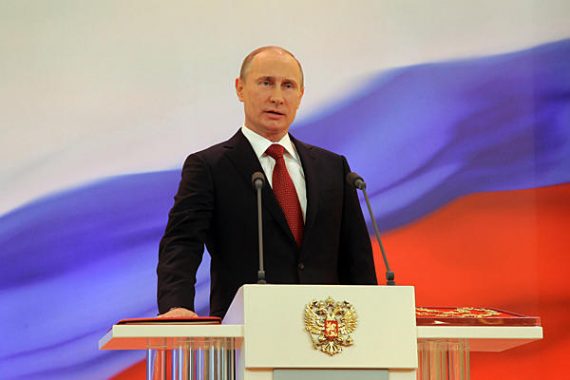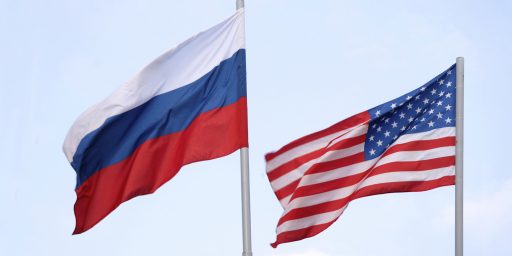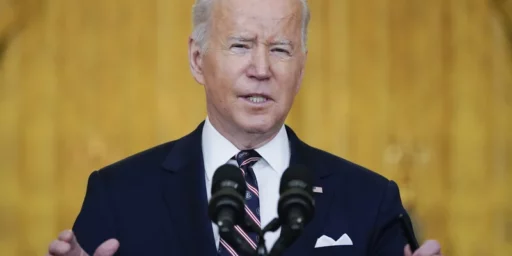Russia Expels 150 Diplomats, Closes American Consulate, In Latest Tit-For-Tat Move
As expected, Russia has retaliated for the retaliation against it in connection with the attempted murder of a former Russian spy and his daughter in the United Kingdom.
In an entirely expected move, Russia has announced that it will expel some 150 diplomats from over a dozen nations and close the American consulate in St. Petersburg in retaliation for similar action taken by those nations, action which of course was rooted in the apparent attempted murder of a former Russian spy on British soil earlier this month:
LONDON — Intensifying Russia’s clash with Europe and the United States, the Kremlin on Thursday announced that it would expel 150 Western diplomats and close the American consulate in St. Petersburg.
The action was in retaliation for the expulsion of more than 150 Russian officials from other countries — which was itself a reaction to a nerve-agent attack on British soil that Britain and its allies have blamed on Moscow.
The United States ambassador to Russia, Jon M. Huntsman Jr., was summoned to the Foreign Ministry, the foreign minister, Sergey V. Lavrov, announced. Sixty American diplomats will be expelled from Russia — the same as the number of Russian diplomats whom Washington has expelled. The Americans were given until April 5 to leave the country.
The crisis over the poisoning of a former Russian double agent and his daughter has driven tensions between the Kremlin and the West to their highest pitch in decades. The tit-for-tat responses raise the prospect of further, more serious escalations, either public or clandestine.
Relations were already rocky, over Moscow’s roles in the wars in Syria and Ukraine, its forcible annexation of Crimea, its meddling in elections in the United States and elsewhere, the assassination of Kremlin foes in Russia and abroad, cyberattacks and disinformation campaigns against other countries and what Western officials have described as a broad, largely covert effort to destabilize and discredit liberal democracies.
Russia as a whole, and many powerful Russians individually, are already under economic sanctions by the West, and London has vowed to tighten its scrutiny and control of the vast Russian wealth — much of it held by allies of President Vladimir V. Putin — that has flowed into Britain in recent years. Britain has also said it will re-examine several suspicious deaths of Kremlin opponents.
Mr. Putin and his government have denied any involvement in the March 4 attack on Sergei V. Skripal and his daughter, Yulia, and have tried to cast blame on Britain, the United States, Ukraine, the Czech Republic and others.
(…)
More than 20 other countries, primarily European, also announced expulsions on Monday, and a few more joined in on Tuesday, as did NATO headquarters in Brussels. The expulsions were a remarkable show of international unity and coordination, in solidarity with Britain, which had already forced 23 Russian officials to leave the country; Moscow responded by expelling 23 Britons.
In all, 27 countries have ejected more than 150 Russians, including people listed by their embassies and consulates as diplomats, and military and cultural attaches. Western officials say that many of the Russians are actually spies, and that the expulsions will hinder Russian espionage efforts.
All of this grows, of course, out of the attempted murder of Skripal and his daughter earlier this month via what British authorities quickly determined to be a deadly nerve agent known to have originated from Russia itself, which lead to the inevitable and seemingly inescapable conclusion that Russia was behind the attack. Soon after Skripal’s poisoning, British Prime Minister Theresa May accused Russia of being behind the attack and denounced them for staging an attempted assassination on British soil. Soon after, British Foreign Secretary Boris Johnson also stated openly that it was “likely” that the attack was directly ordered by Russian President Vladimir Putin himself. Within days after that, May announced retaliatory measures by kicking 23 Russians living in the United Kingdom under diplomatic passports out of the country, hinting that this may not be the only step that the United Kingdom takes. Several days later, Russia announced the expulsion of an equal number of British diplomats, repeating a tit-for-tat pattern that we’ve seen in situations such as this in the past. More recently, the Trump Administration announced that it was expelling 60 Russian diplomats and closing the Russian consulate in Seattle in solidarity with the British. That action was joined by many other nations who also announced the expulsion of Russian diplomats from their own country.
As I said in previous posts since the Skripal attack, this tit-for-tat expulsion of diplomats is something that has been a standard part of diplomacy in general and was quite common during the course of the Cold War between the United States and the Soviet Union. In the end, though, while these moves do end up having some impact on diplomatic operations and intelligence gathering, it really doesn’t seem as though it accomplishes anything definitive. As several observers this week, if the United States really wanted to send a message it would impose sanctions that Russia can’t really retaliate for in exchange. The most effective means, of course, would be to hit the oligarchs and banks tied to Vladimir Putin and the Russian government with direct sanctions. These would arguably be more painful than the sanctions that have been imposed to date and they would be difficult for Russia to respond to in kind since there are few financial ties with the United States that it has control over in any real respect. Perhaps that will come in the future, but for now it’s clear that we’re stuck in this tit-for-tat phase that doesn’t really seem to accomplish anything.







If the Russians want to dabble in chaumurky, we can show them what kanly really means.
Much the same goes for Britain. If they were serious, they’d freeze such assets as the oligarchs have stashed in the UK. If they were really serious, they’d seize those assets.
What does a consulate actually do (as opposed to an embassy)?
Given the current state of relations with Russia, would we better of closing all of our consulates in Russia ourselves?
Who needs diplomats when the entire Trump Administration has direct contact with Putin cronies all the time?
@Franklin:
Yeah, I was wondering just how Trump is handling this. His puppetmaster can’t be very happy.
@Stormy Dragon:
Consulates process visa applications for one thing. They also act as a point of contact for citizens who are visiting or working in the country.
@Stormy Dragon:
Consulates mostly issue visas for visitors from the host country to the consul’s country, deal with passport matters for citizens of the consul’s country, and issue trade licenses for import and export.
@Doug Mataconis:
Given that the Russian government is using those visas to infiltrate assassins into other countries to murder people, I’m not sure making it harder to obtain visas is a bad thing. Likewise encouraging our citizens to avoid the country might be a good idea as well.
@Kathy:
Theresa May is a tower of titanium compared to Trump, but she’s still a weak leader without a clue about much of anything as far as I can tell.
But let’s not let Vlad off the stake here, this hit in the UK was a blunder. It was hubris and overreach from a guy high on his own myths. It was so over-the-top that Trump had no choice but to let himself be bullied by May and the EU and his own people. Sanctions relief gets further and further away, the Russian economy is in a nosedive, the Crimea is still a mess, ditto Syria. You know how people would snark that Russia was an economy the size of Italy? The GDP projection for 2018 has Italy pulling away by half a trillion. Now Russia has the GDP of Australia, a country with just 16% of Russia’s population. Imagine Australia trying to cover the cost of the Russian military establishment.
@michael reynolds: The 2016 US election of Putin’s pals and attempted murders of people critical of Putin has developed not necessarily to Putin’s advantage.
I used to wonder what people who said Putin was good at tactics but terrible at strategy meant by that, but now I know. I do not see any of what he’s doing ending well for him. I hope it won’t be as bad for the rest of the world as it can potentially be.
@rachel:
Never underestimate the capacity of Russians to fail. With typical Russian clumsiness they couldn’t be bothered to arrange a convenient road accident, no, they had to use nerve agents. To send a message to various Putin opponents and of course to Manafort. The net result of which is a coming together of the NATO powers they’ve done so much to separate. Tactics over strategy, losing the large in an impatient grab for the small. The odds of sanctions easing are zero for now, the West is rearming, and Russia has once again made itself a pariah. Well done, Vlad.
@Stormy Dragon: Consulates do routine business–visa applications, merchandise entry permits, collect duties that might have to be prepaid, meet with trade delegation members important enough for a photo op but not able to go to the embassy, etc.